 W
WIn Greek mythology, Aether is one of the primordial deities. Aether is the personification of the "upper sky". He embodies the pure upper air that the gods breathe, as opposed to the normal air breathed by mortals. Like Tartarus and Erebus, Aether may have had shrines in ancient Greece, but he had no temples and is unlikely to have had a cult.
 W
WAidos was the Greek goddess of shame, modesty, respect, and humility. Aidos, as a quality, was that feeling of reverence or shame which restrains men from wrong. It also encompassed the emotion that a rich person might feel in the presence of the impoverished, that their disparity of wealth, whether a matter of luck or merit, was ultimately undeserved. Ancient and Christian humility share common themes: they both reject egotism, self-centeredness, arrogance, and excessive pride; they also recognize human limitations. Aristotle defined it as a middle ground between vanity and cowardice.
 W
WAion is a Hellenistic deity associated with time, the orb or circle encompassing the universe, and the zodiac. The "time" represented by Aion is unbounded, in contrast to Chronos as empirical time divided into past, present, and future. He is thus a god of the ages, associated with mystery religions concerned with the afterlife, such as the mysteries of Cybele, Dionysus, Orpheus, and Mithras. In Latin the concept of the deity may appear as Aevum or Saeculum. He is typically in the company of an earth or mother goddess such as Tellus or Cybele, as on the Parabiago plate.
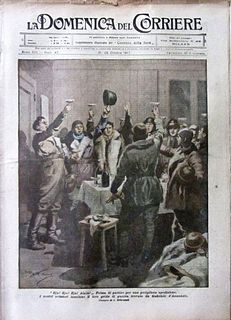 W
WAlala was the personification of the war cry in Greek mythology. Her name derives from the onomatopoeic Greek word ἀλαλή (alalḗ), hence the verb ἀλαλάζω (alalázō), "to raise the war-cry". Greek soldiers attacked the enemy with this cry in order to cause panic in their lines. Hesiod asserted that Athenians adopted it to emulate the cry of the owl, the bird of their patron goddess Athena.
 W
WIn ancient Greek religion, Ananke is the personification of inevitability, compulsion and necessity. She is customarily depicted as holding a spindle. One of the Greek primordial deities, the births of Ananke and her brother and consort, Chronos were thought to mark the division between the eon of Chaos and the beginning of the cosmos. Ananke is considered the most powerful dictator of fate and circumstance; mortals as well as gods respected her power and paid her homage. Sometimes considered the mother of the Fates, she is thought to be the only being to influence their decisions. According to Schowalter and Friesen, she and the Fates "are all sufficiently tied to early Greek mythology to make their Greek origins likely."
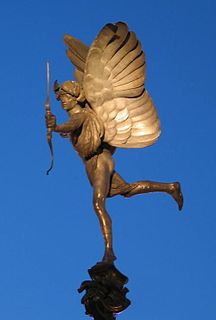 W
WIn Greek mythology, Anteros was the god of requited love, literally "love returned" or "counter-love" and also the punisher of those who scorn love and the advances of others, or the avenger of unrequited love. He is one of the Erotes.
 W
WArete, in its basic sense, means "excellence" of any kind. The term may also mean "moral virtue". In its earliest appearance in Greek, this notion of excellence was ultimately bound up with the notion of the fulfillment of purpose or function: the act of living up to one's full potential.
 W
WAtropos or Aisa, in Greek mythology, was one of the three Moirai, goddesses of fate and destiny. Her Roman equivalent was Morta.
 W
WBorysthenes is a geographical name from classical antiquity. The term usually refers to the Dnieper River and its eponymous river god, but also seems to have been an alternative name for Pontic Olbia, a town situated near the mouth of the same river on the Black Sea coast, or the earlier settlement on Berezan Island.
 W
WChronos, also spelled Khronos or Chronus, is the personification of time in pre-Socratic philosophy and later literature.
 W
WClotho is a mythological figure. She is the one of the Three Fates or Moirai who spins the thread of human life; the other two draw out (Lachesis) and cut (Atropos) in ancient Greek mythology. Her Roman equivalent is Nona. She also made major decisions, such as when a person was born, thus in effect controlling people's lives. This power enabled her not only to choose who was born, but also to decide when gods or mortals were to be saved or put to death. For example, Clotho brought Pelops back to life when his father boiled and killed him.
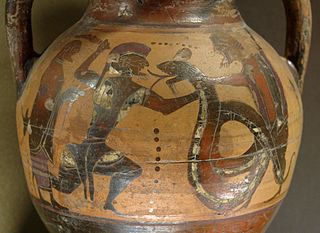 W
WDeimos is the personification of dread and terror in Greek mythology. He was a son of Ares and Aphrodite, and the twin brother of Phobos. Deimos served to represent the feelings of dread and apprehension that befell those before a battle, while Phobos personified feelings of fear and panic in the midst of battle.
 W
WIn ancient Greek culture, Dike or Dice is the goddess of justice and the spirit of moral order and fair judgement based on immemorial custom, in the sense of socially enforced norms and conventional rules. According to Hesiod, she was fathered by Zeus upon his second consort, Themis. She and her mother are both personifications of justice. She is depicted as a young, slender woman carrying a physical balance scale and wearing a laurel wreath. She is represented in the constellation Libra which is named for the Latin name of her symbol (Scales).
 W
WEirene, more commonly known in English as Peace, was one of the Horae, the personification of peace. She was depicted in art as a beautiful young woman carrying a cornucopia, sceptre, and a torch or rhyton. She is said sometimes to be the daughter of Zeus and Themis and sister of Dike and Eunomia. Her Roman equivalent was Pax.
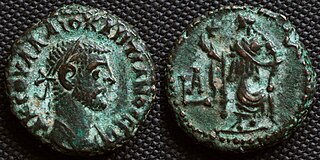 W
WIn Greek mythology, Elpis is the spirit of hope. She was depicted as a young woman, usually carrying flowers or a cornucopia in her hands.
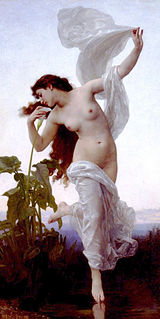 W
WIn Greek mythology, Eos is a Titaness and the goddess of the dawn, who rose each morning from her home at the edge of the Oceanus.
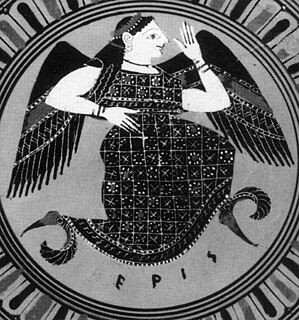 W
WEris is the Greek goddess of strife and discord. Her Roman equivalent is Discordia, which means "discord". Eris's Greek opposite is Harmonia, whose Roman counterpart is Concordia. Homer equated her with the war-goddess Enyo, whose Roman counterpart is Bellona. The dwarf planet Eris is named after the goddess.
 W
WIn Greek mythology, Eros is the Greek god of love and sex. His Roman counterpart was Cupid ("desire"). In the earliest account, he is a primordial god, while in later accounts he is described as one of the children of Aphrodite and Ares and, with some of his siblings, was one of the Erotes, a group of winged love gods.
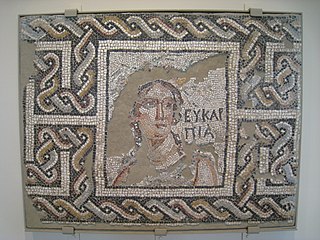 W
WIn ancient Greek religion and myth, Eukarpia was a divine personification of fertility, or an epithet or cult title for a deity. It is also found as a personal name for women.
 W
WEuthenia was the ancient Greek female spirit of prosperity. Her opposite was Penia and her sisters entailed Eucleia, Philophrosyne, and Eupheme. Along with her siblings, she was regarded as a member of the younger Charites. According to the Orphic fragments, her parents were Hephaestus and Aglaea.
 W
WIn Greek mythology, Gaia, also spelled Gaea, is the personification of the Earth and one of the Greek primordial deities. Gaia is the ancestral mother of all life. She is the mother of Uranus, from whose sexual union she bore the Titans, the Cyclopes, and the Giants; of Pontus, from whose union she bore the primordial sea gods. Her equivalent in the Roman pantheon was Terra.
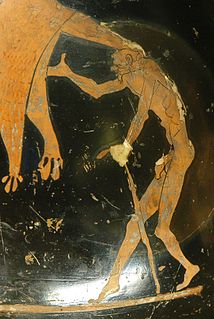 W
WIn Greek mythology, Geras, also written Gēras, was the god of old age. According to Hesiod, Geras was a son of Nyx. Hyginus adds that his father was Erebus. He was depicted as a tiny, shriveled old man. Gēras's opposite was Hebe, the goddess of youth. His Roman equivalent was Senectus. He is known primarily from vase depictions that show him with the hero Heracles; the mythic story that inspired these depictions has been lost.
 W
WIn Greek mythology, Harmonia is the immortal goddess of harmony and concord. Her Roman counterpart is Concordia. Her Greek opposite is Eris, whose Roman counterpart is Discordia.
 W
WHebe in ancient Greek religion, is the goddess of youth or the prime of life. She is the daughter of Zeus and his older sister, Hera. Hebe was the cupbearer for the gods and goddesses of Mount Olympus, serving their nectar and ambrosia until she married Heracles ; her successor was the divine hero Ganymede. Another title of hers for this reason is Ganymeda, meaning "Gladdening Princess". Hebe was worshipped as the goddess of forgiveness or mercy at Sicyon.
 W
WHelios, also Helius, in ancient Greek religion and myth, is the god and personification of the Sun, often depicted in art with a radiant crown and driving a horse-drawn chariot through the sky. He was a guardian of oaths and also the god of sight.
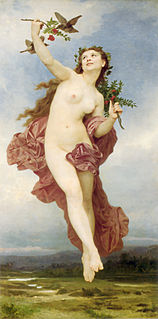 W
WIn Greek mythology Hemera was the personification of day and one of the Greek primordial deities. She is the goddess of the daytime and, according to Hesiod, the daughter of Erebus and Nyx.
 W
WIn Greek mythology, Hermaphroditus or Hermaphroditos was the son of Aphrodite and Hermes. According to Ovid, he was born a remarkably handsome boy with whom the naiad Salmacis fell in love and prayed to be united forever. A god, in answer to her prayer, merged their two forms into one and transformed them into an androgynous form. His name is compounded of his parents' names, Hermes and Aphrodite. He was one of the Erotes.
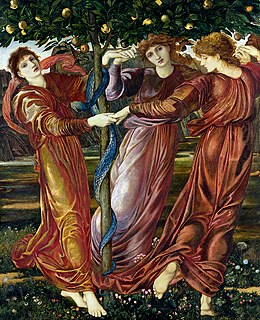 W
WIn Greek mythology, the Hesperides are the nymphs of evening and golden light of sunsets, who were the "Daughters of the Evening" or "Nymphs of the West". They were also called the Atlantides (Ἀτλαντίδων) from their reputed father, the Titan Atlas.
 W
WIn Greek mythology the Horae or Horai or Hours were the goddesses of the seasons and the natural portions of time.
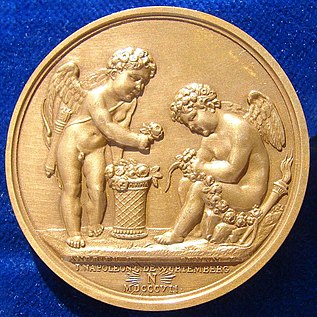 W
WHymen, Hymenaios or Hymenaeus, in Hellenistic religion, is a god of marriage ceremonies, inspiring feasts and song. Related to the god's name, a hymenaios is a genre of Greek lyric poetry sung during the procession of the bride to the groom's house in which the god is addressed, in contrast to the Epithalamium, which is sung at the nuptial threshold. He is one of the winged love gods, Erotes.
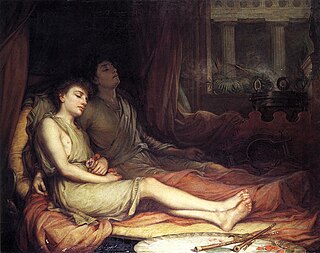 W
WIn Greek mythology, Hypnos is the personification of sleep; the Roman equivalent is known as Somnus. His name is the origin of the word hypnosis.
 W
WKakia, the Greek goddess of vice and moral badness, was depicted as a vain, plump, and heavily made-up woman dressed in revealing clothes. She tried to tempt many people to become evil, but her most famous temptation was that of Heracles, the greatest and most famous of the divine heroes in Greek mythology. "You shall have the fruits of others' toil, and refrain from nothing that can bring you gain. For to my companions I give authority to pluck advantage where they will." Now when Heracles heard this, he asked, "Lady, pray what is your name?" "My friends call me Happiness," she said, "but among those that hate me I am nicknamed Kakia." —Excerpt from Xenophon, Memorabilia 2.1.21 telling of her competition with Arete to sway Heracles to her side (evil).
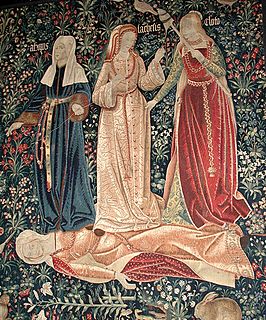 W
WLachesis, in ancient Greek religion, was the second of the Three Fates, or Moirai: Clotho, Lachesis and Atropos. Normally seen clothed in white, Lachesis is the measurer of the thread spun on Clotho's spindle, and in some texts, determines Destiny, or thread of life. Her Roman equivalent was Decima. Lachesis was the apportioner, deciding how much time for life was to be allowed for each person or being. She measured the thread of life with her rod. She is also said to choose a person's destiny after a thread was measured. In mythology, it is said that she appears with her sisters within three days of a baby's birth to decide its fate.
 W
WMetis, in ancient Greek religion, was a mythical Titaness belonging to the second generation of Titans.
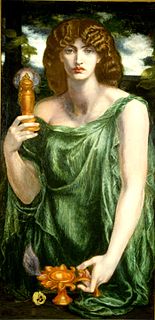 W
WMnemosyne is the goddess of memory in Greek mythology. "Mnemosyne" is derived from the same source as the word mnemonic, that being the Greek word mnēmē, which means "remembrance, memory".
 W
WIn ancient Greek religion, Nemesis, also called Rhamnousia or Rhamnusia, is the goddess who enacts retribution against those who succumb to hubris.
 W
WIn ancient Greek civilization, Nike was a goddess who personified victory. Her Roman equivalent was Victoria.
 W
WNyx is the Greek goddess of the night. A shadowy figure, Nyx stood at or near the beginning of creation and mothered other personified deities such as Hypnos (Sleep) and Thanatos (Death), with Erebus (Darkness). Her appearances are sparse in surviving mythology, but reveal her as a figure of such exceptional power and beauty that she is feared by Zeus himself.
 W
WIn Greek mythology, Peitho is the goddess who personifies persuasion and seduction. Her Roman equivalent is Suada or Suadela. She is typically presented as an important companion of Aphrodite. Her opposite is Bia, the personification of force. As a personification, she was sometimes imagined as a goddess and sometimes an abstract force with her name used both as a common and proper noun. There is evidence that Peitho was referred to as a goddess before she was referred to as an abstract concept, which is rare for a personification. Peitho represents both sexual and political persuasion.
 W
WIn Greek mythology, Pheme, also known as Ossa, was the personification of fame and renown, her favour being notability, her wrath being scandalous rumors. She was a daughter either of Gaia or of Elpis (Hope), was described as "she who initiates and furthers communication" and had an altar at Athens. A tremendous gossip, Pheme was said to have pried into the affairs of mortals and gods, then repeated what she learned, starting off at first with just a dull whisper, but repeating it louder each time, until everyone knew. In art, she was usually depicted with wings and a trumpet.
 W
WPhobos is the personification of fear and panic in Greek mythology. Phobos was the son of Ares and Aphrodite, but does not have a distinct role in mythology outside of being his father's attendant.
 W
WIn Greek mythology, Phthonos was the personification of jealousy and envy, most prominently in matters of romance. In Nonnus's Dionysiaca, he is by proxy the cause of Semele's death, having informed Hera of Zeus's affair with the princess. He also appears in Callimachus's Hymn to Apollo, goading the god into an argument.
 W
WPlutus is the Greek god of wealth. He is either the son of Demeter and Iasion, with whom she lay in a thrice-ploughed field; or the child of Hades and Persephone. In the theology of the Eleusinian Mysteries he is regarded as the "Divine Child."
 W
WIn Greek mythology, Pontus was an ancient, pre-Olympian sea-god, one of the Greek primordial deities. Pontus was Gaia's son and has no father; according to the Greek poet Hesiod, he was born without coupling, though according to Hyginus, Pontus is the son of Aether and Gaia.
 W
WIn Greek mythology, Selene is the goddess of the Moon. She is the daughter of the Titans Hyperion and Theia and sister of the sun god Helios and Eos, goddess of the dawn. She drives her moon chariot across the heavens. Several lovers are attributed to her in various myths, including Zeus, Pan, and the mortal Endymion. In classical times, Selene was often identified with Artemis, much as her brother, Helios, was identified with Apollo. Selene and Artemis were also associated with Hecate and all three were regarded as lunar goddesses, but only Selene was regarded as the personification of the Moon itself. Her Roman equivalent is Luna.
 W
WIn Greek mythology, Thanatos was the personification of death. He was a minor figure in Greek mythology, often referred to but rarely appearing in person.
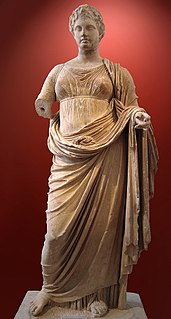 W
WThemis is an ancient Greek Titaness. She is described as "[the Lady] of good counsel", and is the personification of divine order, fairness, law, natural law, and custom. Her symbols are the Scales of Justice, tools used to remain balanced and pragmatic. Themis means "divine law" rather than human ordinance, literally "that which is put in place", from the Greek verb títhēmi (τίθημι), meaning "to put".
 W
WTyche was the presiding tutelary deity who governed the fortune and prosperity of a city, its destiny. In Classical Greek mythology, she is the daughter of Aphrodite and Zeus or Hermes. The Greek historian Polybius believed that when no cause can be discovered to events such as floods, droughts, frosts, or even in politics, then the cause of these events may be fairly attributed to Tyche.
 W
WUranus was the primal Greek god personifying the sky and one of the Greek primordial deities. Uranus is associated with the Roman god Caelus. In Ancient Greek literature, Uranus or Father Sky was the son and husband of Gaia, the primordial Mother Earth. According to Hesiod's Theogony, Uranus was conceived by Gaia alone, but other sources cite Aether as his father. Uranus and Gaia were the parents of the first generation of Titans, and the ancestors of most of the Greek gods, but no cult addressed directly to Uranus survived into Classical times, and Uranus does not appear among the usual themes of Greek painted pottery. Elemental Earth, Sky, and Styx might be joined, however, in a solemn invocation in Homeric epic.